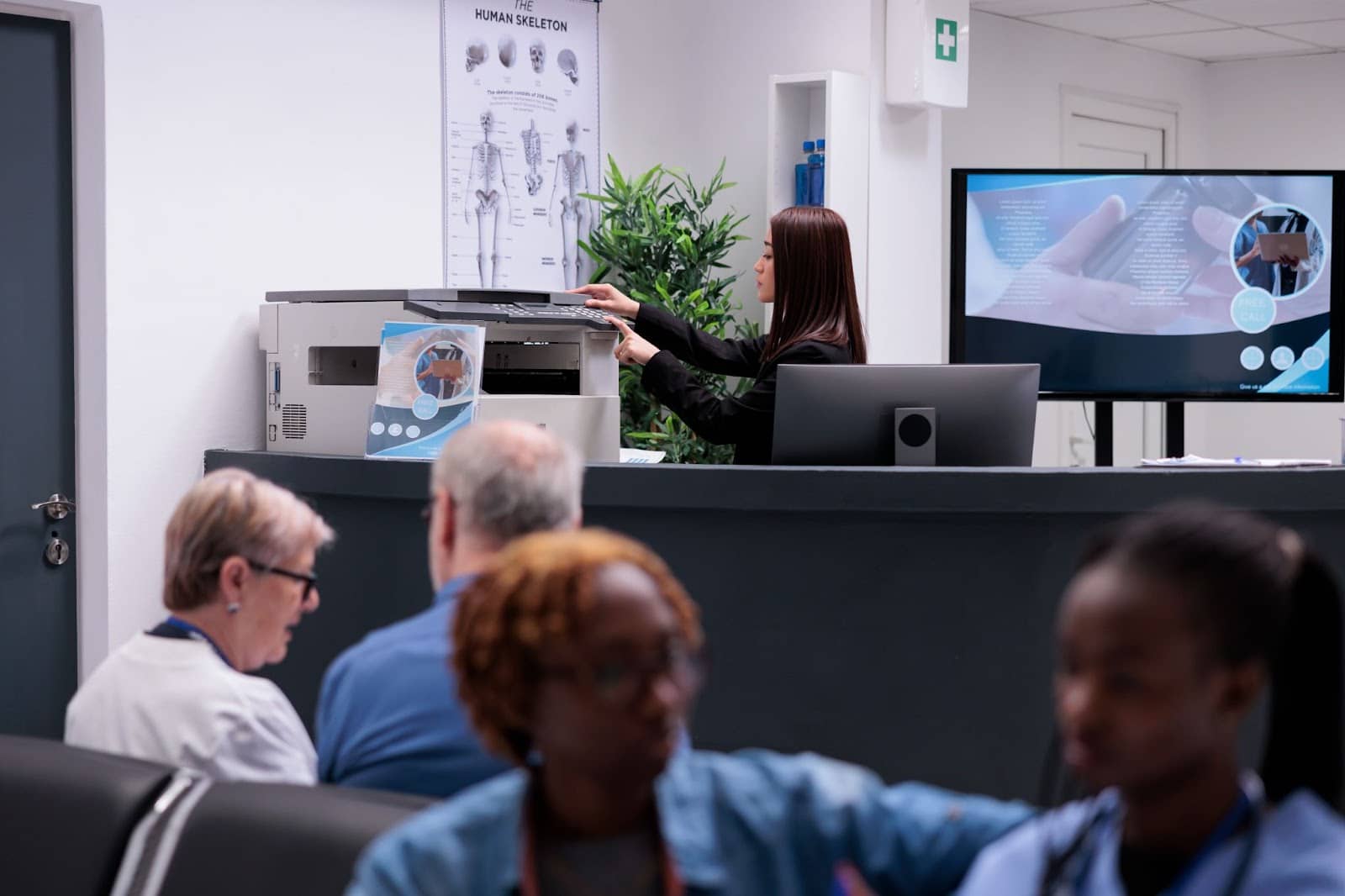Transforming Patient Care in 2024.
In this blog, we take a look at how technology will transform UK patient care in 2024.
Date
2/5/2024
Sector
Health
Subject
Trends
Article Length
4 minutes

Health Tech.
Share Via:
In 2024, the landscape of healthcare is undergoing a remarkable transformation fueled by advancements in health technology. The convergence of innovative solutions, artificial intelligence (AI), and a growing acceptance of technology by the public has ushered in a new era in patient care and healthcare professions. This evolution is not without challenges, but the benefits are promising, providing a glimpse into a future where patient experience and healthcare jobs are significantly enhanced.
Public Attitudes towards Health Technology
Recent research, such as the study commissioned by the NHS Confederation supported by Google Health and conducted by Ipsos, revealed that a majority of the public is not only open to embracing health technology but actively seeks its integration into their healthcare journey. Over 70% of respondents expressed willingness to use health technology to avoid hospital visits, indicating a strong preference for remote and digital healthcare solutions. This sentiment extends to wearable devices and health monitoring tools, with 72% of individuals expressing their readiness to utilise such technologies to manage and monitor their health.
Furthermore, the survey underscores a shifting paradigm in healthcare, emphasising the public's increasing appetite for leveraging technology to self-manage their care. Almost 80% of respondents were open to using various health monitoring equipment if recommended by NHS professionals. The NHS App is also gaining traction, especially among those diagnosed with long-term conditions, with 53% of this group using the app compared to 33% of the general population.
Benefits of Emerging Health Technologies
The ongoing integration of emerging health technologies promises several critical benefits. Matthew Taylor, Chief Executive of the NHS Confederation, emphasises that technology has the potential to empower patients to manage their health actively, especially if it means reducing hospital admissions. From wearables to at-home healthcare solutions, digital innovations are playing a pivotal role in maintaining population health, intervening earlier, and offering tailored treatment options.
Susan Thomas, UK Director at Google Health, highlights these findings with the mission to help everyone be healthier through meaningful health information. The collaboration between Google Health, NHS Confederation, and Ipsos demonstrates the shared commitment to exploring the transformative potential of technology in healthcare.
Shaping the Future of Healthcare Workforce
The concerns about AI and technology replacing jobs have been addressed in recent policy papers, including the NHS Long Term Workforce Plan (2023) and the Topol Review conducted in 2019. Rather than leading to job losses, technology is transforming the nature of work in healthcare, as emphasised in the research conducted by The Health Foundation.
The framework presented by The Health Foundation in their 2023 study, offers insights into the evolving roles of healthcare professionals in the context of automation. It categorises technology's impact into modes such as substituting, superseding, supporting, and strengthening human labour. It indicates that while some routine tasks might be automated, technology enables healthcare workers to focus on tasks requiring critical thinking, creativity, and emotional intelligence – tasks and roles challenging for AI to replicate.
The Evolving Role of GP Receptionists
A case study on the role of GP receptionists illustrates how technology can impact healthcare roles. Automation can relieve receptionists of routine tasks, allowing them to redirect their attention to more person-centred and challenging areas of work. For example, software streamlining patient registrations could assist in identifying patients with specific health conditions, enabling receptionists to extract valuable insights for the practice team.
This shift in task distribution within roles would likely lead to a fundamental transformation like healthcare professions, placing a greater emphasis on care navigation and patient interaction, reducing paperwork and improving appointment utilisation. Such changes not only alleviate pressures in primary care but also contribute to improved patient experiences, recruitment, and retention.

Policy and Future Vision
The Health Foundation's initiative to explore the opportunities presented by technologies in supporting healthcare staff is a crucial step in shaping the future. Acknowledging the transformative potential of technology, there is a call for a proactive approach involving policymakers, healthcare providers, professional bodies, technologists, and the public.
A shared vision is essential for the evolution of professions and occupations in healthcare, driven not only by policymakers but crucially by the healthcare workforce itself. Staff should be empowered to actively participate in shaping the future of healthcare, signalling the types of technologies that can improve their working lives and patient care.
Government Statistics and Future Implications
The UK Government Bioscience and Health Technology Sector Statistics (2021/22) highlight the thriving and resilient nature of the life sciences industry. The steady growth in the number of businesses, totalling 6,850, and the 1% increase in sites to 7,910 demonstrate the industry's consistent expansion. Employment experienced a significant 5% relative increase, employing 304,200 people, signifying the sector's role as a major contributor to job creation.
The biopharmaceutical core sector contributed significantly to the total turnover, showcasing diverse strengths within the industry. Regionally, the South East continued to lead with the highest shares in employment (23%) and turnover (30%).
Even amid the challenges of the COVID-19 pandemic, the industry showcased resilience, experiencing growth in employment and turnover, affirming its pivotal role in the nation's economy and the health technology landscape.
Conclusion
The state of health technology in 2024 reflects a dynamic and promising landscape. Public openness to technology, coupled with the positive impact on patient care and healthcare professions, suggests a future where technology plays a central role in shaping healthcare experiences. As healthcare professionals actively engage in the evolution of their roles, supported by robust policies and collaborative efforts, the synergy between human expertise and technological innovation will continue to redefine the healthcare journey.